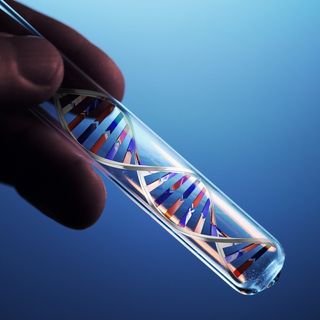FDA Limit on 23andMe Genetic Tests Called Unwarranted

The Food and Drug Administration's recent action to stop the sale of genetic tests by the company 23andMe is unwarranted, according to scholars who argue that recent research shows such tests do not cause people distress, or encourage risky behavior.
In November, the FDA asked 23andMe to stop marketing its DNA testing kits, saying that the kits are medical devices that require FDA approval. The agency said it was concerned about the accuracy of the tests, as well as the possibility that consumers might misunderstand their results and take actions that could be harmful, such as stopping their medications. Shortly after the FDA's request, 23andMe said it would stop providing health information to customers along with their test results.
But today, some legal and genetic experts are calling the FDA's approach overcautious. The FDA is basing its concern on speculation, rather than proven harms, said Nita Farahany, a professor of genome sciences and policy at Duke University. [7 Diseases You Can Learn About From a Genetic Test]
"We should wait for empirical evidence of harm, not act before there's any evidence of harm," said Farahany, who authored an editorial about the issue published today (Jan. 15) in the journal Nature, with Dr. Robert Green, a medical geneticist at Brigham and Women’s Hospital in Boston.
Potential benefits
Recent studies of more than 5,000 people suggested that test results from direct-to-consumer genetic tests do not cause distress or inappropriate treatment, and in fact, might promote healthy behaviors such as increasing physical activity, according to the editorial.
A 2009 study of more than 3,000 people who received results from direct-to-consumer genetic tests found that participants did not experience a change in anxiety or psychological health.
Sign up for the Live Science daily newsletter now
Get the world’s most fascinating discoveries delivered straight to your inbox.
And a 2010 study of 1,000 customers found that less than 1 percent altered prescription medications without speaking to their doctor. Meanwhile, 72 percent improved their eating habits and 61 percent improved their exercise habits, the editorial says.
"A lot of the data show that the kind of actions people take are really very helpful actions," Farahany said.
Restricting access to this information is a step backwards, Farahany said. Although there's always a concern that people will misunderstand genetic testing results, people can misunderstand any type of medical information, including information delivered by doctors, Farahany said.
Experts should work to improve education about genetic testing results, said Farahany, who was herself an early 23andMe customer.
Expert concerns
However, other experts applauded the FDA action.
Gail Wenger, a geneticist and director of the Cytogenetics and Molecular Genetics Laboratories at Mercy St. Vincent Medical Center in Toledo, Ohio, said she thought the test results from the company were likely accurate. "It's in the interpretation, and it's the claims for what the interpretation can provide for the consumer, that I think is the more problematic area," she said.
"If you sent the same person's DNA to four different labs, would they come up with the same answer?" Wenger said. A recent New York Times article pursued this question, and found that different genetic testing companies can produce very different estimates of disease risk, even when testing the same individuals' DNA.
Farahany said genetic testing companies, including 23andMe, should be more transparent about how they assess a person's risk of a given disease.
Barbara Bernhardt, a genetic counselor and professor of medicine at the University of Pennsylvania School of Medicine, agreed with the editorial authors that there has been more evidence of benefits than harms from consumer testing, mainly in terms of people modifying their behavior to act more healthfully.
However, "I think the way [genetic tests are] packaged now in terms of using SNPs to predict disease risk will never be particularly powerful," Bernhardt said. SNP stands for single nucleotide polymorphisms, and these are single spots in the DNA that vary among people and have been linked in research studies to diseases.
In an interview in November, Amy Sturm, a genetic counselor at The Ohio State University Wexner Medical Center, told LiveScience that direct-to-consumer genetic tests provide "a very incomplete view" of a person's risk, because so many factors contribute to the development of disease.
23andMe does advise consumers to speak with their doctors if they have concerns about their results, and also offers to connect people with genetic counselors to explain results. But it's unclear how many people take advantage of these services, Sturm said.
Farahany said researchers should continue to examine how consumers react to test results, as the studies that have been conducted so far are preliminary, Farahany said.
Follow Rachael Rettner @RachaelRettner. Follow LiveScience @livescience, Facebook & Google+. Original article on LiveScience.

Rachael is a Live Science contributor, and was a former channel editor and senior writer for Live Science between 2010 and 2022. She has a master's degree in journalism from New York University's Science, Health and Environmental Reporting Program. She also holds a B.S. in molecular biology and an M.S. in biology from the University of California, San Diego. Her work has appeared in Scienceline, The Washington Post and Scientific American.
Most Popular


